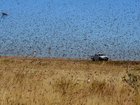The choppers swoop in, dumping insecticide over a plague-stricken village in Madagascar's stunning central highlands.
"The goal is to break the invasion," explains Tsitohaina Andriamaroahina, head of a U.N. mission to end a locust plague threatening the crops of 13 million farmers on this island nation.
 Full Story
Full Story
Paleontologists in Argentina's remote Patagonia region have discovered fossils of what was likely the largest dinosaur ever to roam the earth.
The creature is believed to be a new species of Titanosaur, a long-necked, long-tailed sauropod that walked on four legs and lived some 95 million years ago in the Cretaceous Period.
 Full Story
Full Story
A Delta 4 rocket has lifted off from Cape Canaveral carrying a GPS satellite.
The United Launch Alliance rocket that soared into space Friday will place a navigation satellite into the Global Positioning System constellation for the Air Force. This is the sixth such satellite deployed by the Air Force.
 Full Story
Full Story
A teenage girl who fell into a hole more than 12,000 years ago in Mexico's Yucatan Peninsula is offering new clues about the origins of the first Native Americans, researchers said Thursday.
Named "Naia" by scientists, her skeleton is among the oldest known and best preserved in the Americas.
 Full Story
Full Story
Dinosaur fossils found in Patagonia provide the first evidence that long-necked, whip-tailed diplodocid sauropods survived well beyond the Jurassic period, when they were thought to have gone extinct, Argentine paleontologists said Thursday.
Pablo Gallina, a researcher at Buenos Aires' Maimonides University, described the find as the first definitive evidence that diplodocids reached South America, and the most recent geologic record of this branch of sauropod anywhere.
 Full Story
Full Story
Ecuador declared an environmental emergency in the Galapagos Islands Thursday, after a freighter carrying pollutants ran aground last week.
The measure will free up resources to remove the ship and mitigate its impact in the face of "possible environmental damage that could unleash a disaster" said the Directorate of the Galapagos National Park (DPNG).
 Full Story
Full Story
A Russian Proton rocket carrying a European-built satellite fell back to Earth on Friday shortly after liftoff in the latest accident to hit the country's once-proud space industry.
Russian space officials said the rocket's control engine failed 545 seconds after it took off from the Baikonur space centre that Moscow leases in Kazakhstan.
 Full Story
Full Story
Corn farmers in the verdant plains of southwestern France have responded to dwindling water resources by adopting drip irrigation -- a money-saving technique invented in the 1960s in Israel.
Initially adopted in water-poor regions including the vineyards and orchards of southern France, the method has begun appearing in big agriculture further north in the past three years.
 Full Story
Full Story
As she has every day for 26 years, Delfina Salinas, a stocky Mexican woman, loads plastic jugs onto her donkey for a 30-minute walk to fetch water.
In Tehuixtitla, a mountainous area south of Mexico City, there is no running water. Salinas is used to this drudgery.
 Full Story
Full Story
The limbs of an 11-year-old boy have been found inside a huge crocodile and his head discovered nearby after he was attacked in Papua New Guinea, a report said Wednesday.
The four-meter (13-foot) croc grabbed the boy, Melas Mero, as he was fishing with his parents on Thursday at the Siloura River in Gulf Province in the south of the Pacific nation, police commander Lincoln Gerari told PNG's National newspaper.
 Full Story
Full Story



